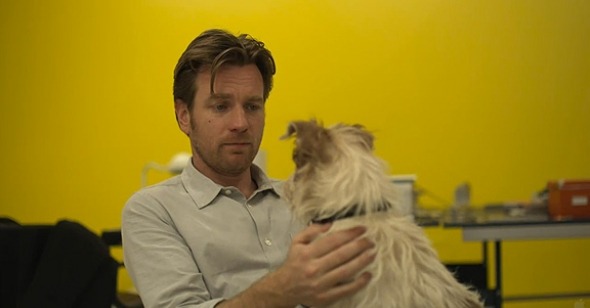Father Figurine
By Michael Koresky
Beginners
Dir. Mike Mills, U.S., Focus Features
There won’t be a dry cheek in the house after sitting through Mike Mills’s tearjerker Beginners, but that’s only because of all the cuteness that practically drips off the screen. In fact, you might want to wear a trenchcoat to this pornographically precious romcom masquerading as a poignant working-out of daddy issues. Mills conceived of his second feature, following the oddly hyped but frivolous yawp of teen angst Thumbsucker, as a tribute to his father. After his wife’s death, the seventy-something man had admitted his homosexuality to his son, much to the latter’s immense surprise, before dying himself a few years later. To convey this deeply personal tale onscreen, Mills casts eminently elegant Christopher Plummer as pops, cuddly Ewan McGregor as himself, and Inglourious Basterds’ it-girl Mélanie Laurent as his beautiful French fling, and calls it a day. There’s no denying the chops and attractiveness of this cast, but perhaps that seamless professionalism and charm is the problem: once translated to film, this potentially intriguing age-reversed coming-out scenario becomes the stuff of movie-movie-land. Ultimately, Mills seems to have less interest in finding out what made his late father tick than going through the motions of another idiosyncratic American indiewood product about an emotionally closed off young man who just needs to open his heart to the right woman.
Beginners’ edgeless, grating adorability is established early: we’re in melancholy-comic territory, especially clear from McGregor’s character Oliver’s Umberto D.–like relationship with his Jack Russell terrier, Arthur. Arthur is granted the gift of subtitles, so that we privileged movie watchers can see what he’s thinking, or at least what Oliver believes him to be thinking. It’s a cloying gag that successfully gets reflexive squeals of delight and approving “awwws” from its audience. (Mills’s partner, Miranda July, gets a lot more mileage out of a similar trick in her upcoming The Future, which is narrated by a sad and sleepy kitty cat—at least July’s similarly precious film fully integrates the whimsically anthropomorphized animal into the film’s philosophical basis: the creature yearns for love and rejects the constraints of time.)
Had the supporting puppy been cast as comic relief from a more sharply defined world of recognizably shaded human beings then perhaps Mills’s indulgence would be defensible: unfortunately, Plummer’s fresh out-of-the-closet father turns out to be as much of a one-note construct as little Arthur. Mills clearly is attempting to empathize with him, and Beginners is nothing if not good-natured and compassionate, but Hal, as written, is glib and one-dimensional: Mills seems only interested in quizzically monitoring his single-minded devotion to gay causes in his dotage—he’s not seen doing much more than organizing a gay book club, a gay movie night, writing letters to politicians on civil rights issues, unwrapping copies of The Advocate delivered in the mail, and hosting parties for a bunch of fabulous—and nameless—new friends. While it’s nice to watch Plummer so respectfully embody a man coming into his own and living life honestly, tragically with so little time left (he is soon diagnosed with cancer), he comes across as something of an enigma: he’s an icon of pride, and a befuddling stranger.
Mills’s approach to the character is sweet and inoffensive, yet imagine how fascinating Beginners might have been if he had written it from the father’s point of view: a true act of empathy and curiosity. Instead, we get endless scenes of Oliver scampering around Los Angeles with his sprightly savior, an actress played by Laurent whom he meets cute at a costume party (she has laryngitis, so is initially forced to scrawl things on a notepad). With her adorable neuroses and gamine eyes, she’s a preposterously perfect conceit—but as a love interest she’s infinitely preferable to Plummer’s barely visible much younger boyfriend, Andy, played by a mincing Goran Visnjic with a mop of bad hair, a thoroughly insecure screwball distrustful of straight men. After Hal dies, Andy accuses Oliver of avoiding him—as viewers we may also wonder why Mills didn’t pay him enough attention.
There’s the kernel of a terrific character study here, but Mills seems to have focused on the wrong guy. As always, McGregor is an impossibly warm screen presence (he made decency and naiveté sexy in last year’s I Love You Philip Morris) and a fount of charm, but despite his efforts, Oliver is unable to transcend being a type we’ve seen far too many times in movies, as well as a self-aggrandizing portrait on Mills’s part, disguised as a painful exposé. Did Oliver really have to be a clever cartoonist who in his downtime sprays super-cool, politically astute graffiti all around L.A.? And did the film’s two idiosyncratic young lovebirds have to goofily go roller-skating in the Biltmore Hotel lobby to prove their exceptional, made-for-each-other nonconformity? Befitting Oliver’s and his film’s funny-papers aesthetic, Mills intersperses cartoony philosophical asides about American life from the fifties to today (narrated, naturally, by a Scottish actor with a shaky American accent). They’re entirely superfluous, intended to lend weight to some flimsy scaffolding, but they also momentarily get Mills to move away from his own precious autobiographic pursuits.
Perhaps because of David Fincher’s remarkable recent run, the once-accepted notion of the music-video director as cinematic savior is again in vogue. How else to explain the praise for Mills’s film, which seems made up mostly of visual queues bound to convention. There isn’t a surprising choice in terms of camera, performance, music, or editing throughout. On the other hand, Beginners is quite pleasant. But affability can only go so far, especially in a movie that raises knotty issues related to both sexuality and family. Beginners is so frightened of wrestling with the tough stuff that it seems practically inhuman.
